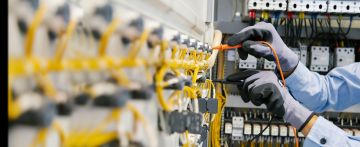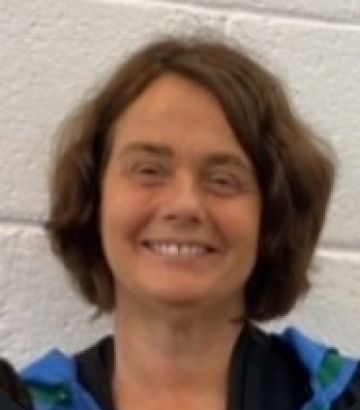Electrical Engineering

What is Electrical Engineering?
Electrical Engineering is primarily concerned with the generation , transmission and distribution of Electrical power , the design and development of electrical machines and equipment and the specification of electrical service plans for industrial buildings and facilities.
There is also a major emphasis on ensuring that 70% of Irelands electricity demand is met by renewable energy sources such as wind , solar and hydro by 2030. Electrical Engineers work on development of of smart electrical grids and communications to allow for the effective utilisation of renewable energies.
What is the BEng (Hons) in Electrical Engineering?
The BEng (Hons) in Electrical Engineering is a full-time, four year, honours degree course of study that can be chosen within the Engineering Common Entry Route. The primary aim of the programme is to produce graduates of high calibre who possess a thorough knowledge of scientific principles and engineering practice and an appreciation of the work and business environment in which the professional engineer must work. SETU Waterford aims to create an open, stimulating environment for students and aims to provide access to an appropriate range of facilities and equipment.
The programme core content has a strong emphasis on nurturing an ability to foster analytical thinking and reasoning. A 6-month industrial placement helps give the student a context for some of the material already learnt and will provide a stimulus in the final year of learning.
Five module groups forming a pathway (across the years) can be identified in the programme:
- Control Engineering modules form a group of modules across the programme to provide a specialist area. This group includes Analog Control, Digital control and Robotics and Vision. These modules are also heavily supported by the programming modules HLL programming and Software applications and Algorithms
- Electrical Systems: the area of Electrical power and distribution is covered in Electrical Power Systems, Electrical Power Systems project, Renewable Energies, Project Specification and Project Implementation.
- Mathematics module group that run across the programme. Although mathematics in year 4 is not represented explicitly, it is prominent and applied in modules such as Electrical Signal and Systems and the control modules.
- Industrial Studies and Personal Development module group: Industrial Placement, Semiconductor Technology, Industrial Standards and Legislation, and Operations management
- Telecommunications / communications Module group: Telecommunications, Data Communications
Placement & Project
As part of the course there is a nine month work placement which allows the student to develop their skills in an electrical engineering environment. Students have undertaken their work placement in areas such as Pharmaceutical, Construction, Control ,Lighting design, and Utilities.
The final year of the programme has a major project component consisting of 2 modules namely project specification and project implementation.
Year 1
| Semester 1 | Semester 2 |
|---|---|
| Introduction to Engineering | Analogue Electronic Devices |
| Engineering Computing | DC Circuit Theory |
| Engineering Maths 1 | Introduction to Programming |
| Engineering Professionalism | Introduction to Electronic & Electrical Technology |
| Engineering Physics 1 | Engineering Maths 2 |
| Engineering Physics 2 |
Year 2
| Semester 3 | Semester 4 |
|---|---|
| Electrical Embedded Project | Electrical Machines |
| Electrical Engineering | Electrical Power Engineering |
| Instrumentation & Measurement | Electrical Services Design |
| Lighting & Daylighting Design | Industrial Automation |
| Sustainable Hear & Power Generation Technologies | Industrial Electronics |
| Maths Ordinary Differential Equations | Maths Advanced Calculus |
Year 3
| Semester 5 | Semester 6 |
|---|---|
| Advanced Engineering Maths | Industrial Studies & Placement |
| Electrical Power Systems | |
| Electrical Health & Safety | |
| HLL Programming | |
| Smart Grid Communications Technology | |
| Telecommunications |
Year 4
| Semester 7 | Semester 8 |
|---|---|
| Algorithms & Applications | Project Implementation |
| Analogue Control | Digital Control |
| Data Communications | Energy Management of Buildings |
| Pharma Compliance & Law | Operations Strategy / Innovation |
| Project Specification | Robotics & Vision |
| Theory & Applications of Transformers & Line Reactors | Smart Grid Technology / Renewable Energies |
Leaving Cert: Entry requirements for the BEng (Hons) in Electrical Engineering:
2 subjects: H5
4 subjects: O6/H7
English or Irish: O6/H7
Mathematics: O2/H6
Advanced and Equivalent Entry for the BEng (Hons) in Electrical Engineering:
Students who complete other engineering courses at SETU, or another third level institution, at ordinary degree level or equivalent, may apply to transfer onto this course at the third year stage. Students who complete level 6 higher certificate programmes in engineering may apply for entry into this course at the second year stage.
Employment Opportunities for BEng (Hons) in Electrical Engineering graduates
Graduates from this program may find employment in fields such as:
- Pharmaceutical Industry
- Medical Technology
- Process Control and Plant Automation
- Power Generation
- Renewable Energies
- Semiconductor Fabrication Industries
Follow on Study from the BEng (Hons) in Electrical Engineering
The aim of the course board is to have the programme accredited by Engineers Ireland in line with other level 8 engineering programmes within the university. The student may then apply to join appropriate level 9 programmes (MEng) within SETU Waterford and at other institutes.
Employment Opportunities for BEng (Hons) in Electrical Engineering graduates
Graduates from this program may find employment in fields such as:
- Pharmaceutical Industry
- Medical Technology
- Process Control and Plant Automation
- Power Generation
- Renewable Energies
- Semiconductor Fabrication Industries
The aim of the course board is to have the programme accredited by Engineers Ireland in line with other level 8 engineering programmes within the university. The student may then apply to join appropriate level 9 programmess (MEng) within SETU and at other institutes.
Stream Leader

Ms Siobhan Wall
Lecturer in Electronic and Electrical Engineering -
Call: +35351302060
Email: [email protected]
Profile






